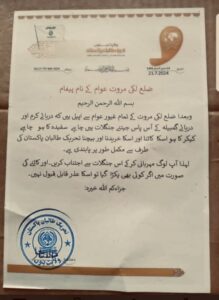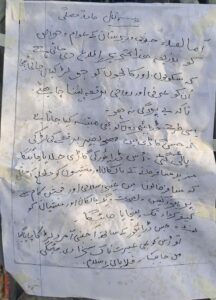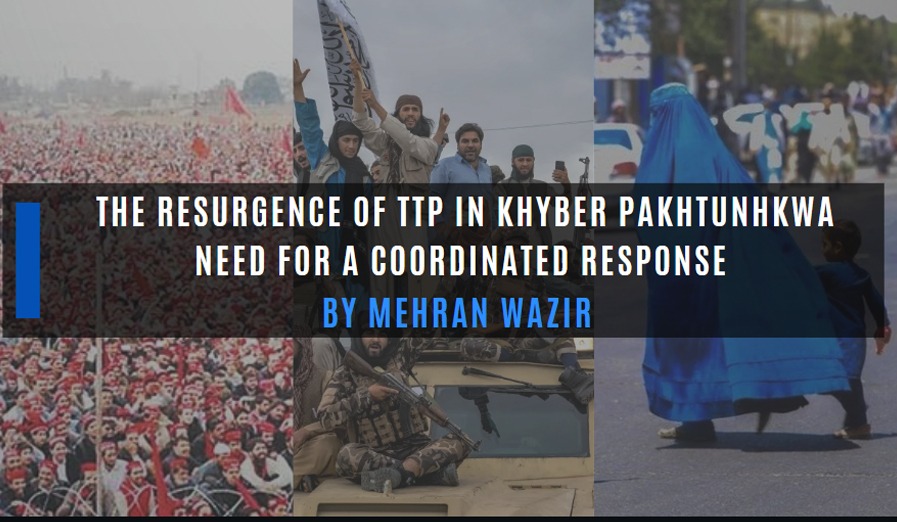By Mehran Wazir
The threat posed by Tehrik-e-Taliban Pakistan (TTP) has resurfaced, alarming both local populations and the Pakistani government. Recent pamphlets issued by TTP in different districts highlight the militant group’s ongoing influence and the dire situation faced by residents in Khyber Pakhtunkhwa. Distrust upon the security forces’s action and stragtegy further complicates action against the Taliban. These pamphlets, along with verifying reports from various media sources, underscore the urgent need for concerted and coordinated efforts to counter this insurgency.
In the first pamphlet, TTP addresses the people of Lakki Marwat district, warning them to cease trading timber from the local forests (majority are bushes, though the pamphlet mentioned it) between river Kurram and river Gambila. The group has imposed a complete ban on cutting and selling these resources, threatening severe consequences for non-compliance. Such directives not only disturb the mobility but also instill fear among the people, compelling them to adhere to TTP’s control over the area.
According to the locals the Taliban are settled along the banks of the Kurram River in the village of Mamakhel and Nasir Khel, known as Darga. Several operations have been conducted here, and many terrorists have been killed. The Taliban are also settled in various locations from the Betani area to Bachkan Ahmadzai and the Gambila Bridge along the Gambila River. They frequently emerge from the bushes along the Gambila River and attack the Adamzai police checkpoint every other day before retreating.
The locals have reported that the security forces have asked them to cut down the forests because they serve as hideouts for the Taliban. Meanwhile, the Taliban are protecting their hideouts by forbidding the locals from cutting the trees. The residents of Lakki Marwat are under pressure from both the Taliban and the security forces. However, the security forces could conduct operations against the TTP in the area without causing any collateral damage, but instead, they are asking the residents to cut down the trees.

In another pamphlet, the Taliban (under the name of Fidayaan-e-Islam) warned the people of South Waziristan to ensure that girls adhere to a strict hijab while attending schools and colleges. Violators will face severe consequences. The pamphlet further states that drivers who transport girls to and from schools and colleges should not provide services to those who do not wear a strict Islamic hijab. The Taliban threatened to set fire to the car of any driver who does not comply with this warning. Additionally, the pamphlet emphasizes that local hotels in the Wana Bazaar (the district headquarters of South Waziristan) should not be used for illicit, un-Islamic activities or drug-related crimes.

On the other hand, social and political workers in various areas of Khyber Pakhtunkhwa are questioning the willingness and strategy of the security forces’ actions against the Taliban in the province. They believe that the recently announced military operation, Azam-e-Istehkam, will be as futile as previous operations, where only civilians suffered. Political parties and other socio-political movements in the province claim that the re-emergence of the TTP and other Taliban groups with full operational capacity indicates that these terrorists were spared in previous military operations. They also suggest that, in addition to the Afghan Taliban, other forces and individuals are supporting the Pakistani Taliban.
Another significant question posed by Pashtun nationalist political parties is who is responsible for the resettlement of Taliban fighters in Khyber Pakhtunkhwa. They argue that those responsible must be brought to justice before any further military operations are undertaken in the province.
According to a report by Voice of America, the TTP has increased its activities in the region, emboldened by support from the Afghan Taliban. This cross-border support has strengthened the TTP’s capabilities, making them a formidable threat to regional stability. The TTP’s activities, including the distribution of pamphlets, exemplify their strategy of using psychological warfare to maintain control over local populations. It has been observed that with the Taliban’s occupation of Kabul, Taliban groups in the region have gained power and support. Meanwhile, the Pakistani establishment and mainstream Punjabi political parties, including Pakistan Tehrik-e-Insaf (PTI) and Pakistan Muslim League Nawaz (PML-N), celebrated this occupation and promised friendly relations with the Afghan Taliban. Another main issue is that Pakistan is confused about the Taliban and their support system. Political forces in Khyber Pakhtunkhwa demand action against the Taliban’s support system rather than a full-scale military operation.
International actors, particularly the United Nations, have urged the Afghan Taliban to sever ties with TTP and cease providing them with safe havens . The UN’s involvement underscores the global implications of TTP’s activities, which extend beyond Pakistan’s borders and threaten regional security.
A comprehensive analysis by Stimson Center advocates for enhanced political cooperation to address the militant threat in Pakistan. The report suggests that fostering collaboration between different political parties and involving local communities in peacebuilding initiatives can help stem the tide of militancy. Strengthening governance structures and providing economic opportunities are crucial steps in undermining TTP’s influence and restoring stability in Khyber Pakhtunkhwa.
The resurgence of TTP is a grave concern for Pakistan, particularly for the residents of Khyber Pakhtunkhwa who bear the brunt of the group’s intimidation and violence. The pamphlets issued by TTP serve as stark reminders of the militant group’s pervasive control and the urgent need for a coordinated response. Pakistan’s willingness to take serious action against TTP, supported by international pressure and political cooperation, is essential to counter this growing threat and restore peace to the region. By understanding the complexities of TTP’s operations and the impact on local communities, policymakers can develop more effective strategies to combat this insurgency and ensure the safety and well-being of all citizens. Any strategy and action should be design in collaboration with political forces in the country in general and in Khyber Pakhtunkhwa in particular, otherwise it will not be supported by the people and will be a futile exercise.

